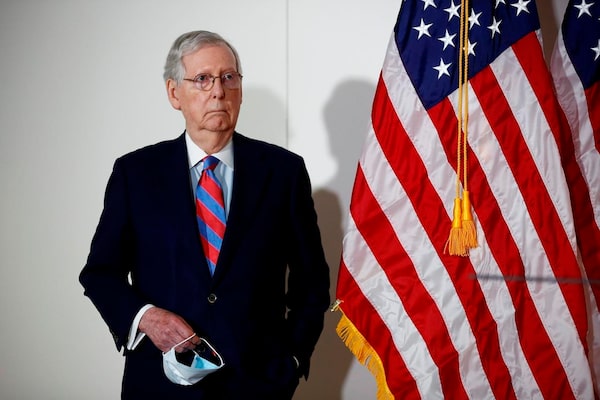
Senate Majority Leader Mitch McConnell of Ky., holds a face mask used to protect against the spread of the new coronavirus as he attends a news conference on Capitol Hill in Washington, Tuesday, May 12, 2020.The Associated Press
House Speaker Nancy Pelosi lashed out Thursday at Trump administration officials and congressional Republicans seeking to slow work on a fresh round of coronavirus relief. The White House responded minutes later with a threat that President Donald Trump would veto the $3 trillion economic package Democrats have proposed.
The bill already had zero chance of passing the GOP-controlled Senate and reaching Trump, making the veto threat a symbolic gesture. Along with caustic criticism by Senate Majority Leader Mitch McConnell, the exchange underscored the deep election-year gulch over what Congress’ next response to the crisis should be.
But Pelosi’s proposal served as an opening move and is likely to eventually produce negotiations among congressional leaders and the White House.
At a Capitol news conference, Pelosi, D-Calif., lambasted Republicans who’ve said they want to hold off for now on more relief spending. “It’s amazing to me how much patience and how much tolerance someone can have for the pain of others,” she said.
Pelosi told reporters she believed both parties “and even down Pennsylvania Avenue” — a reference to the White House — understand “the hardships Americans are feeling.” She called the Democratic proposal “our offer” and said while she’s had no recent negotiations with Treasury Secretary Steven Mnuchin, the administration’s chief bargainer, “I’m sure that they’ll come with something.”
White House officials quickly released a statement of their own. It said the legislation Pelosi unveiled Tuesday is “more concerned with delivering on long-standing partisan and ideological wish lists than with enhancing the ability of our Nation to deal with the public health and economic challenges we face.”
McConnell said later Thursday on Fox News that there was a “high likelihood” Congress would do another bill and said it would include GOP-sought language limiting legal liability for companies reopening for business. He added, “But it’s not going to be a $3 trillion left-wing wish.”
The Democratic bill would provide nearly $1 trillion to help financially struggling state and local governments, extend special unemployment benefits and direct payments to individuals, and bolster spending for health care programs and essential workers.
The House on Friday plans to approve the measure, which would be Congress’ fifth and largest bill aimed at nursing the teetering economy through the coronavirus crisis. The measure is likely to pass on a near-party line vote and eventually lead to negotiations.
Objections listed by the White House and McConnell included provisions rolling back GOP-passed tax increases on residents of states with high taxes and making it easier for people to vote by mail and for immigrants in the U.S. illegally to receive some federal assistance.
The White House criticized $25 billion in aid for the struggling Postal Service, a favourite Trump target. McConnell singled out what he called “the cherry on top” — provisions helping legal marijuana businesses.
Congress has approved nearly $3 trillion in recent weeks to address the country’s twin economic and health crises, including money for coronavirus testing.
Republicans have expressed worries about burgeoning budget deficits and said lawmakers should evaluate how the initial dollars are being spent before moving fresh legislation. They also want to see whether the economy begins to recover as some states begin easing restrictions that have kept many businesses shuttered.
Friday’s House vote will come as 36 million Americans have applied for unemployment benefits since the virus hit the U.S. In addition, 1.4 million people in the U.S. have confirmed cases of the virus and more than 85,000 have died.
Federal Reserve Chair Jerome Powell has said a painful, prolonged recession could take hold unless Congress provides fresh aid to bolster the all-but-dormant economy.
Trump’s views on what to do next have been unclear. He’s pushed for a reduction of payroll taxes that’s gained little support in Congress.
Trump has also cautioned GOP lawmakers not to box themselves in by opposing aid for state and local governments, according to a top GOP congressional aide who described Trump’s view on condition of anonymity. Many state and local officials of both parties have sought more federal aid as they face eroding revenue and growing costs for unemployment and health programs.